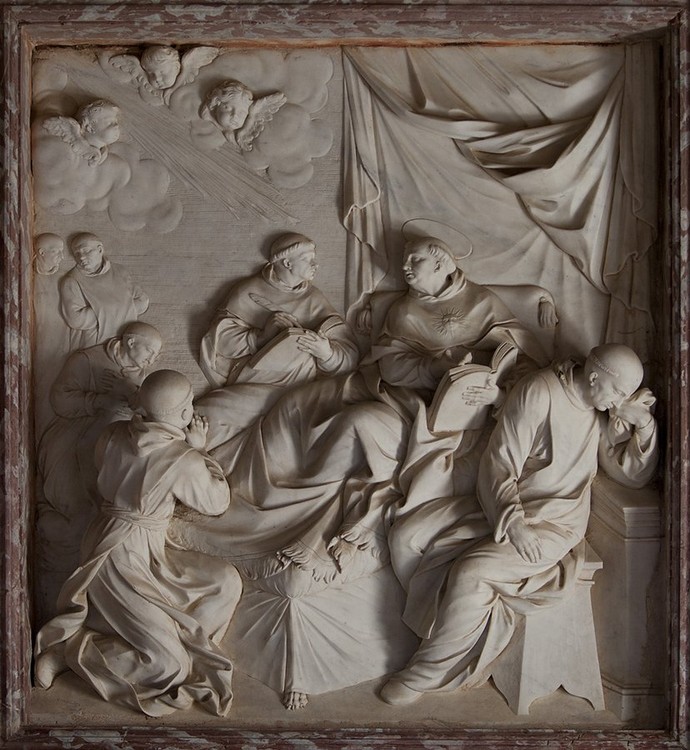
This year’s Feast of Saint Thomas Aquinas falls within the Triple Jubilee of the saint celebrating the 700th anniversary of his canonization (July 18, 1373), the 750th anniversary of his death (March 7, 1274), and the 800th anniversary of his birth (1225). As I noted before, the Church chose January 28 — the date his relics were translated from the Abbey of Fossanova to Toulouse in France in 1369 — as his feast day in 1969 in order to keep the celebration from falling within the season of Lent. So, today is not exactly the 750th anniversary of his death, but probably is, or is close to, when he fell ill in 1274 and was ultimately brought to the Cistercian monastery where he would ultimately die.
There are a couple of details about his lingering illness and ultimate death at Fossanova as recorded in the records of his canonization inquiry that I find interesting. The first is that upon entering the monastery, he allegedly quoted Psalm 131 (132):14, Hæc réquies mea in sæculum sæculi: hic habitábo, quóniam elégi eam. (This is my rest for ever and ever: here will I dwell, for I have chosen it.) I am sure he uttered this piously to indicate that he knew he would die here, but Saint Thomas is actually quoting God through the psalmist as approving the placement of the Ark of the Covenant on Mount Zion in Jerusalem and as establishing the permanence of the Davidic royal line. Christians read this psalm as a prophecy of the coming of the Son of God (Jesus) to fulfill the promise of the eternal kingdom of David through his decedents, and God’s abiding presence among His people.

Second, I find interesting the accounts of how he died and what he requested be read to him from Scripture. As G. K. Chesterton notes,
It may be worth remarking, for those who think that he thought too little of the emotional or romantic side of religious truth, that he asked to have The Song of Solomon read through to him from beginning to end.
The Dumb Ox (Image Books 2014, p. 118

Some accounts assert that Saint Thomas on his deathbed commented line-by-line on the Song of Songs, and that the monks of Fossanova recorded this commentary; indeed, there are preserved texts of commentaries attributed to Saint Thomas, but these have proved to be spurious. It seems a bit much to believe that the dying friar should be lucid enough to offer a commentary on the book, and it would seem to go against the claim he had stopped his literary or theological work. But, it is still remarkable that Saint Thomas would choose for the monks to read so ’emotional or romantic’ a work of Scripture to him as he lay dying.
For those who may not be familiar with it, The Song of Solomon (or The Song of Songs (Canticum Canticorum)) is a collection of love poems in the Wisdom literature of the Old Testament having allegorical meaning as declarations of affection, desire, and joy between God and His people Israel, and, for Christians, being fulfilled in the marriage of Jesus Christ to His Bride, the Church. As the Introduction to the Song of Songs in the New American Bible puts it:
The Song of Songs (or Canticle of Canticles) is an exquisite collection of love lyrics, arranged to tell a dramatic tale of mutual desire and courtship. It presents an inspired portrayal of ideal human love, a resounding affirmation of the goodness of human sexuality that is applicable to the sacredness and the depth of married union.
…
While the lovers in the Song are clearly human figures, both Jewish and Christian traditions across the centuries have adopted “allegorical” interpretations. The Song is seen as a beautiful picture of the ideal Israel, the chosen people whom the Lord leads by degrees to a greater understanding and closer union in the bond of perfect love. Such readings of the Song build on Israel’s covenant tradition….
Christian tradition has followed Israel’s example in using marriage as an image for the relationship with God. This image is found extensively in the New Testament (Mt 9:15; 25:1–13; Jn 3:29; 2 Cor 11:2; Eph 5:23–32; Rev 19:7–9; 21:9–11). Thus the Song has been read as a sublime portrayal and praise of this mutual love of the Lord and his people. Christian writers have interpreted the Song in terms of the union between Christ and the Church and of the union between Christ and the individual soul, particularly in the writings of Origen and St. Bernard.
Song of Songs, Introduction.
The opening lines of the Song, indeed, are remarkable for their passion and earthy humanity:
2 Let him kiss me with kisses of his mouth,
Song of Songs, 1
for your love is better than wine,
3 better than the fragrance of your perfumes.
Your name is a flowing perfume—
therefore young women love you.
4 Draw me after you! Let us run!
The king has brought me to his bed chambers.
Let us exult and rejoice in you;
let us celebrate your love: it is beyond wine!
Rightly do they love you!
The Scripture gets racier still:
7 How beautiful you are, how fair,
Song of Songs, 7
my love, daughter of delights!
8 Your very form resembles a date-palm,
and your breasts, clusters.
There seems to be evidence that the Song of Songs had been laying upon Saint Thomas’s mind toward the end of his life, and so it may not be surprising he sought out this work of Scripture to be read to him when his life finally did end. In a late work, Compendium of Theology, possibly composed close to when Saint Thomas received the mystical experience after which he stopped writing, he does not use “beatific vision” exclusively as model for experience of heaven, as he did consistently in the Summa Theologiae (cf., I-II, 2, 8; 3, 8). Rather, he emphasizes also the love of enjoyment or possession of the Beloved by citing Scripture’s use of comprehension to describe the union of the blessed with God in heaven. Instead of approving the cognitive sense of this term, since comprehensive knowledge of God is impossible for a created intellect (ST I, 12, 7), he invokes comprehension as the permanent grasp of lovers.
The ultimate good is also known as comprehension, a word suggested by Philippians 3:12: “I follow after, if I may by any means comprehend.” The term is not, of course, used in the sense according to which comprehension implies enclosing; for what is enclosed by another is completely contained by it as a whole. The created intellect cannot completely see God’s essence, that is, in such a way as to attain to the ultimate and perfect degree of the divine vision, and so to see God to the extent that he is capable of being seen….
Nevertheless, comprehension is promised to the saints, in the sense of the word ‘comprehension’ that implies a certain grasp…. Accordingly, while we are in the body, as the matter is put in 2 Corinthians 5:6–7, “we are away from the Lord, for we walk by faith, not by sight.” And so we press on toward him as toward some distant goal. But when we see him by direct vision we shall hold him present within ourselves. Thus in the Song of Songs 3:4, the spouse seeks him whom her soul loves; and when at last she finds him she says: “I held him, and I will not let him go.”
Compendium of Theology, Book II, Chapter 9, 23.
To be sure, Saint Thomas still considers our final happiness to consist in “direct vision” through intellectual knowledge or apprehension of the Divine Essence in Himself. But here in this late work, he invokes the Song of Songs to emphasizes the “comprehension” in the sense of “certain grasp” that the soul will have, and by its own act of will, i.e., its love of Him Who is seen in that vision, clings permanently to its Beatific Vision, and enjoys the consummation with Him Whom the soul loves in its vision.
For Saint Thomas at the end of his life to emphasize the love with which a soul in heaven clings to the Beatific Vision of God in Himself, perhaps gives a nuance to the age-old dispute between Dominicans and Franciscan, Saint Thomas and Saint Bonaventure, over what is more fundamental to the Christian life, knowledge of God or love of God. On this Jubilee Feast of Saint Thomas Aquinas, let us rejoice in contemplating the truth that knowledge and love become one in the Beatific Vision, and yearn for that consummation with love of the Ultimate Good as delivered through Truth Himself.
If you are in Houston, Texas, USA, the University of Saint Thomas is hosting a week-long Festival of Saint Thomas starting Sunday, January 28, on the Feast of Saint Thomas Aquinas.
- Click here to view an article on the University’s website giving some background and listing the event planned for the week.
- Visit the UST Campus Ministry Facebook page for a list of the week’s events.
One thought on “Happy Feast of Saint Thomas Aquinas – 2024 Jubilee: the Consummation of Love”